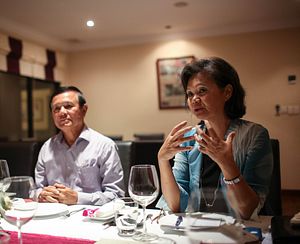The trial of a top Cambodian opposition leader charged with treason began Wednesday, more than two years after he was arrested in what is widely seen as a politically motivated prosecution.
Kem Sokha was head of the Cambodia National Rescue Party when he was arrested in September 2017 on the basis of an old video showing him at a seminar where he spoke about receiving advice from U.S. pro-democracy groups.
He could be imprisoned for up to 30 years if found guilty. His party was dissolved by Cambodia’s Supreme Court in November 2017 on the same basis.
The actions were seen as intended to ensure victory by long-serving Prime Minister Hun Sen’s Cambodian People’s Party in the 2018 general election by eliminating the only credible opposition force. Cambodia’s courts are considered to be under government influence.
“I know strongly that I am totally innocent so I have to go to the court and challenge the charge and demand that they drop the case,” Kem Sokha told The Associated Press on Wednesday. “I have never done anything wrong so the court has to drop the charges.”
It was unclear whether the public would get a fair account of Kem Sokha’s testimony, as the court had earlier announced there would be no room for journalists in the courtroom.
Chan Chen, one of Kem Sokha’s lawyers, told reporters after the morning court session that the case’s political nature requires that it be solved by talks among politicians rather than in court.
“My colleagues and I know that Kem Sokha’s case is one about politicians’ differing points of view, and needs to be solved through political means,” he said, alluding to a past political settlement that ended a civil war with the communist Khmer Rouge.
The morning session was occupied by legal formalities as evidence was introduced for the trial. Chan Chen said that when the video clip was introduced, the defense noted that it was an abbreviated, edited version of their client’s remarks, and they would be presenting a complete version.
The human rights group Amnesty International called for the charges against Kem Sokha to be dropped.
“After two years held in arbitrary detention, the authorities have not presented a shred of credible evidence to support a charge of treason,” said Nicholas Bequelin, the group’s regional director.
“The non-existent crime was politically manufactured to further the suppression of the opposition party. The Phnom Penh Court must acquit Kem Sokha to bring an end to this mockery of justice,” he said.
The trial begins at a politically delicate time for Hun Sen, as Cambodia faces likely trade sanctions from the European Union.
Hun Sen has been in power for 35 years and has vowed to serve two more 5-year terms in office.
His party swept all the seats in the National Assembly in the 2018 polls, but drew condemnation from human rights groups and Western nations, which charged that the election was neither free nor fair.
The EU began a process that could result in its withdrawal of preferential duty-free and quota-free status for imports from Cambodia because of deficiencies in labor and human rights. It is due to announce its decision in February.
The threatened action could badly hurt the Cambodia economy, which depends heavily on exports of low-cost textiles and footwear. The EU accounts for almost half of Cambodia’s exports.
Cambodia is one of several developing nations with whom the EU has an “Everything But Arms” — or EBA — program granting preferential access to the European market for products other than weapons.
Hun Sen has publicly said he won’t let Cambodia be pushed around and its low-cost export industries can survive without the benefit of the trade privileges.
The courts late last year allowed Kem Sokha to be freed on bail after a period of tightly restricted house arrest, but he is still banned from political activity. The opposition party’s co-founder, Sam Rainsy, has been in self-imposed exile since 2015, avoiding prison for a defamation charge along with a slew of other legal charges brought by the government.
Kem Sokha’s trial is expected to take up to three months, meeting twice a week, said Phnom Penh Municipal Court President Taing Sunlay, according to a report by the U.S.-government-funded Voice of America.
Opposition supporters were warned against provocative activities during the trial. A few dozen supporters gathered outside the court, which was guarded by police.
As reported by Sopheng Cheang of The Associated Press.
































